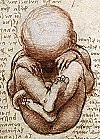| Part of a series on |
| Human growth and development |
|---|
 |
| Stages |
| Biological milestones |
| Development and psychology |
Prenatal psychology can be seen as a part of developmental psychology, although historically it was developed in the heterogenous field of psychoanalysis. Its scope is the description and explanation of experience and behaviour of the individual before birth and postnatal consequences as well. In so far as the actual birth process is involved one can consider this perinatal psychology. Pre- and perinatal aspects are often discussed together.[1]
Prenatal and perinatal psychology explores the psychological and psychophysiological effects and implications of the earliest experiences of the individual, before birth (prenatal), as well as during and immediately after childbirth (perinatal). Although there are various perspectives on the topic, a common thread is the importance of prenatal and perinatal experiences in the shaping the future psychological development. There is a debate among scientists regarding the extent to which newborn infants are capable of forming memories, the effects of any such memories on their personality, and the possibility of recovering them from an unconscious mind, which itself is the subject of argument in the field. A widespread assumption concerning the prenatal phase was that the fetus is almost completely shielded from outside stimuli. Thus, perception and consciousness would develop after birth. Meanwhile, there is a great number of scientific studies which show clearly that behaviour, perception and learning is already developed before birth. This also holds for nonhuman species, as for rat fetuses acoustic conditioning can be demonstrated.[2]
- ^ For an overview see: Lloyd DeMause: The fetal origins of history. In: Lloyd deMause: Foundations of Psychohistory.Creative Roots, New York, 1982, p. 244–332; Ludwig Janus: Die Psychoanalyse der vorgeburtlichen Lebenszeit und der Geburt. Centaurus, Pfaffenweiler 1993, S. 1–72; Ralph Frenken: Symbol Plazenta: Die Pränatalpsychologie der Kunst. Springer, Wiesbaden 2015, S. 5–61.
- ^ Smotherman, William P.; Robinson, Scott R. (1994). Classical conditioning of opioid activity in the fetal rat. In: Behavioral Neuroscience, 108 (5), S. 951–961.